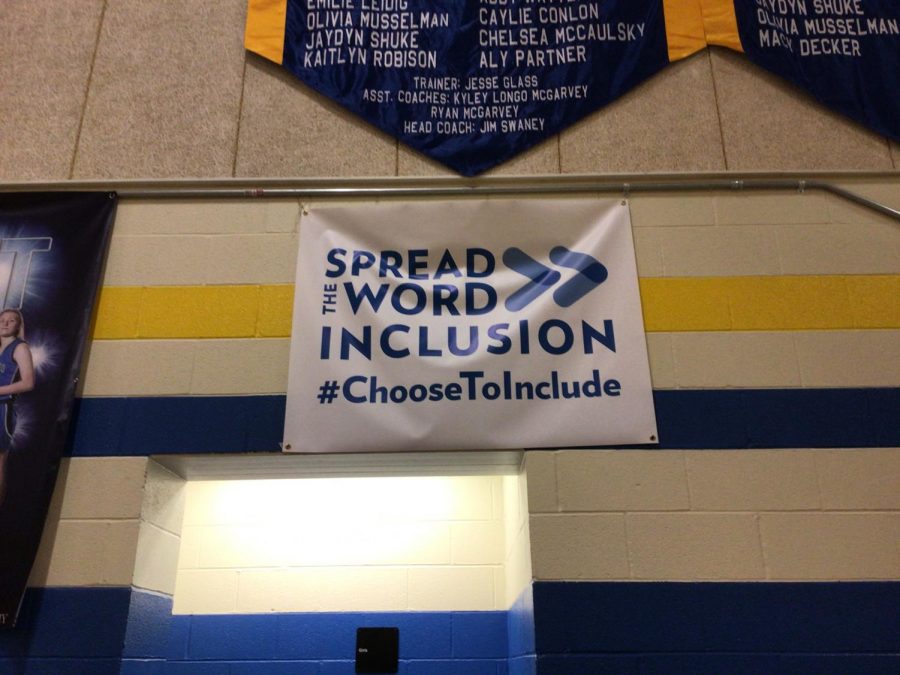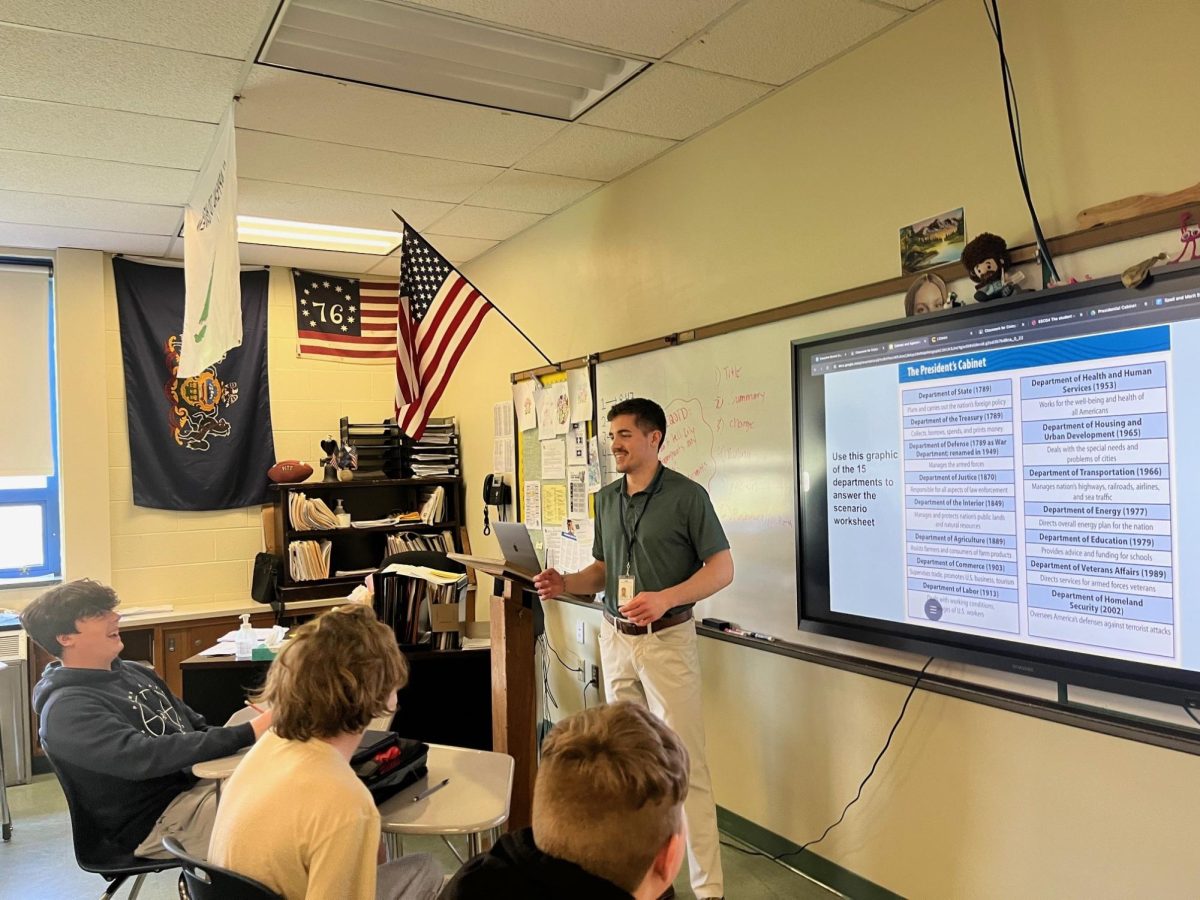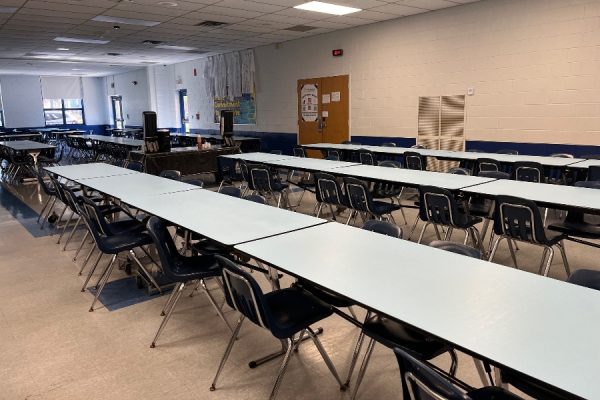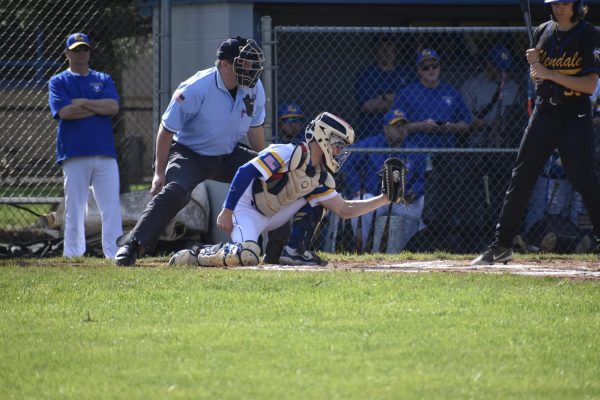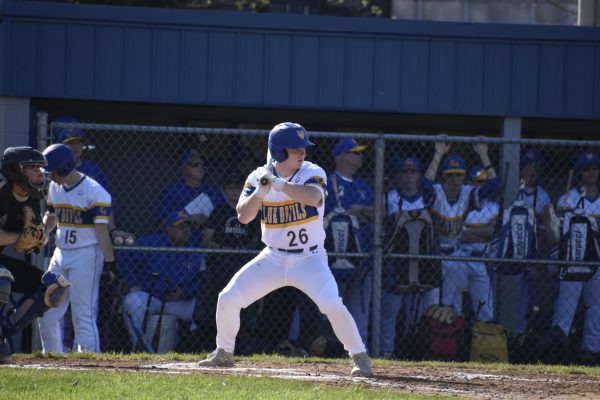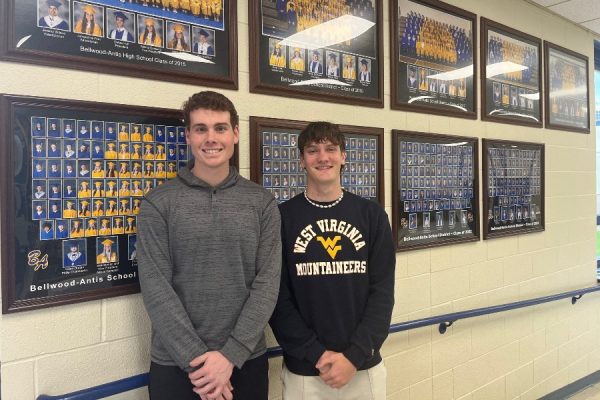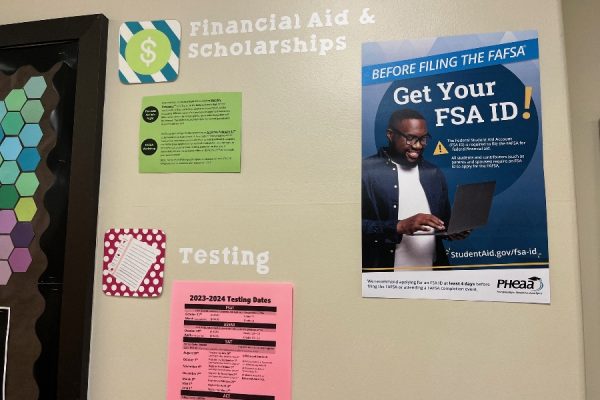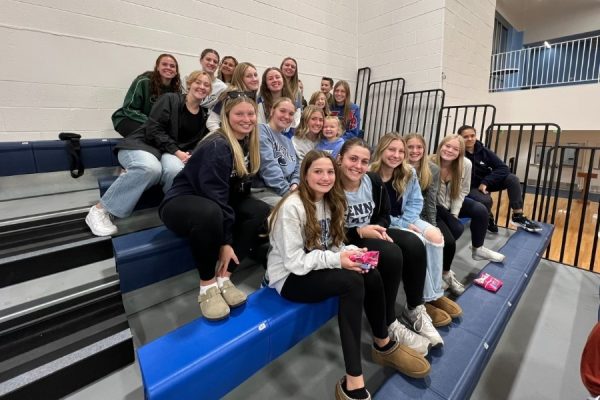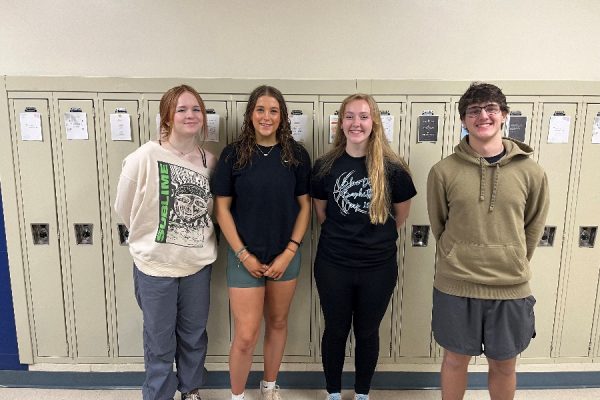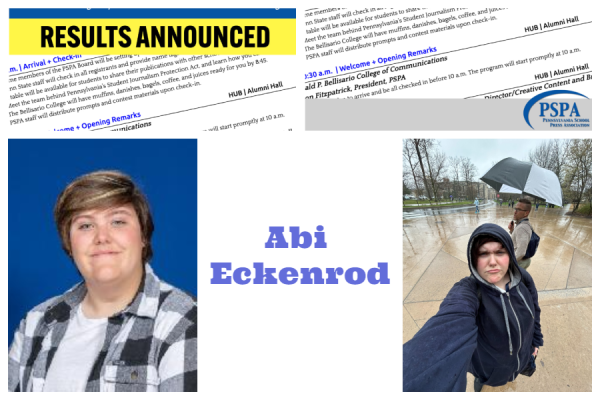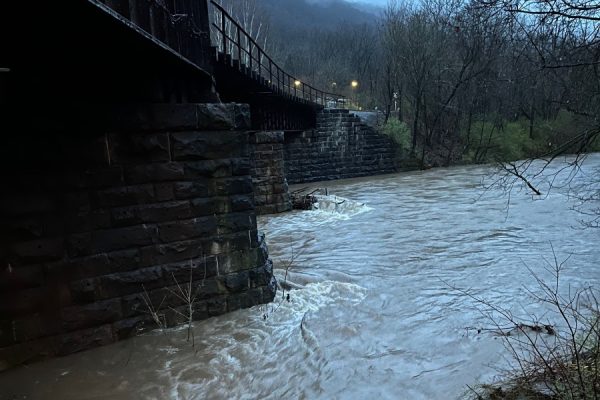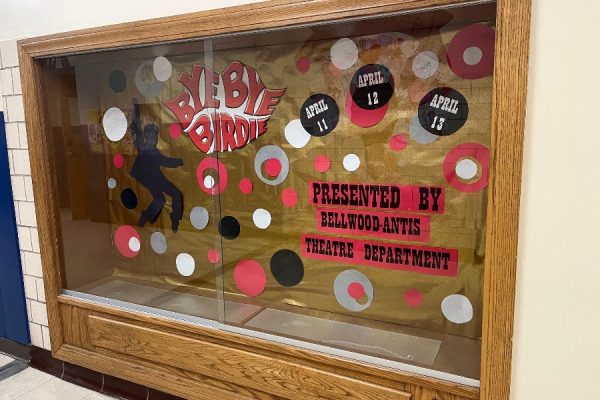A philosophy of inclusion benefits everyone at B-A
This banner hangs in the Bellwood-Antis high school gymnasium to serve as a reminder that everyone is included, no matter their talents.
March 12, 2021
Society tends to place a negative stigma on people who are “different” or “don’t fit in.” However, differences are what make people unique – what sets them apart from the rest of the world.
If one was to walk through the halls of the Bellwood-Antis School District, he or she would see an array of students traversing from class to class, no matter their differences. No matter the class, students of all learning abilities are included.
Such an approach to education can be challenging in the controlled environment of a typical classroom. The difficulty could be compounded when it moves to the fast-paced setting of hands-on courses, like art and physical education. However, that hasn’t been the case at B-A; in fact, the partnership between Life Skills and regular education has helped the program thrive, while inspiring teachers and students alike.
HISTORY OF INCLUSION
In 1990, the passage of the Individuals with Disabilities Act (IDEA) required all school districts to develop and provide a free, appropriate public education for all children. The first major legislation of its kind, IDEA required that education be provided in the least restrictive environment for each child, meaning that students with disabilities should be taught in neighborhood schools in general education classes. The re-authorization of IDEA in 1997 guaranteed more than access to education for students with disabilities; it ensured the rights to a quality education and quality outcomes. Another re-authorization of IDEA occurred in 2004 to align it more closely with the general education No Child Left Behind Act of 2001, while retaining, expanding, and clarifying important elements of the 1997 law. The onset of inclusion has resulted in over 90% of students with disabilities receiving education in typical schools and almost half were included in the general classroom 80% of the day. An increasing number of students with disabilities are graduating from high school, with over half a million earning a diploma.
Ten years ago, B-A established the Life Skills program for students in adapted learning. Health and physical education teacher Mr. Nick Lovrich has been working with the Life Skills programs since the beginning, alongside P.E teachers Mrs. Lori Nyman and Mr. Brent Hughes, in an adaptive physical education class. There, the teachers often work to partner Life Skills students with those in traditional education.
A few years ago, the district began to spread the inclusion message through the hashtag #ChooseToInclude, which embraces children with disabilities and supports why they should not be excluded solely based on their capabilities. In 2018, the high school fielded its first Unified Bocce team, where regular education students paired with those eligible for Special Olympics to compete in a PIAA sponsored sport.
More recently, the Inclusion club was recently established by Mrs. Leah McNaul, spreading awareness on the topic.
BENEFITS FOR ALL
Mrs. McNaul, the middle school and high school art teacher, like many other teachers at Bellwood, has classes mixed with general education students and students who receive learning support services. Since she is a specials teacher, she has been able to include Life Skills students, as well. Over the years, she says, the experiences she has had with students through B-A’s policy of inclusion has brought happiness into her life. This led her to start the Inclusion club, a group that welcomes all students into the student body for the sole purpose of appreciating differences.
Being more inclusive just means opening yourself up to that beauty and embracing it.
— Mrs. Shannon Elder
“I have only had life skill students in my room for I believe 6 or 7 years now,” McNaul said. “Although those students have a modified project from their peers, they are exposed to the greater student body and the student body is exposed to them and together all students learn patience, inclusion and love. Over the years they have brought much joy to my life and I am sad to see my first students graduating this year.”
Unlike Mrs. McNaul, who opted to use her love for all students in an inclusive manner, Life Skills teacher Mrs. Shannon Elder came to the philosophy of inclusion through her family. Mrs. Elder has an uncle who has an intellectual disability, and as a young person she was intrigued by his view of the world. That motivated her towards her career choice.
“During my senior year of high school, I volunteered with a life skills music class. I got to know students with a variety of abilities: autism, down syndrome, deaf/ blindness,” Mrs. Elder said. “I saw how much those kids, my peers, loved social interaction but were often excluded from other kids our age. I loved spending time with those students. I wanted others to see how amazing they were.”
SOCIAL EXPANSION
B-A has not only created a path for Life Skills students to join in the general curriculum, but it has found ways to allow regular education students to play a role in the Life Skills program. For example, senior Caroline Nagle has been avid in her involvement with Mr. Lovrich’s adapted P.E. classes.
“I got involved when Mr. Lovrich asked me one morning if I wanted to play games with some of the students in the adapted learning classes when they were working on communication skills,” Nagle explains. “I was honored that he provided me with the opportunity. I love getting to play games like Go Fish, Battleship, and Guess Who. We also talk about how their days are going. It’s a wholesome way to spend my sixth period. I would encourage students to just do the little things like learn their names and say ‘hi’ to them in the halls. Things like that make people feel more important and cared about.”
Nagle’s focus on the social aspect of the program highlights the fact that the Life Skills program has provided avenues for new friendships to form. Sophomore Parker Lucas, who is a student in Mrs. Elder’s program, has made many new friends from the general education population, and teacher April Cramer said he was excited enough that he wrote down their names so he could remember them.
“Some people I know about my age. I love it,” he said.
BETTER THINGS TO COME
Going forward, B-A is looking to be more inclusive of all students, not just those in adapted learning because, as Mrs. Elder points out, the benefits go both ways.
“I would love to see more inclusion,” said Elder. “Not just of kids in the special education program, but of all students. We all thrive when we can be our authentic selves. Students in this program are no different. I would love to continue building relationships and programs that foster those friendships.”
One key, Elder said, is overcoming the stigma of being different.
“There’s this belief that people with disabilities are ‘too different.’ And sometimes different is scary,” Mrs. Elder said. “But I would say the best thing we can do is to get to know the people around us. The students that I work with and people like my uncle aren’t as different as we might think.”
Like all kids, Mrs. Elder said, her students like music and movies. They enjoy friendship and conversation.
“It just takes reaching out and starting a conversation to make it more familiar. We’re all unique in some way. And the world is full of beautiful and unique people. Being more inclusive just means opening yourself up to that beauty and embracing it,” she said.
In the end, Mr. Lovrich adds, everyone benefits from inclusion, not just those in special education.
“In regards to Life Skills students being in a regular physical education class, it gives them a chance to socialize with other students and learn from their peers. For the traditional education students, it gives them a chance to be with students they are not normally with and see how great the students in the Life Skills classes are,” Mr. Lovrich said. “Our society unfortunately has a negative stigma towards people who are ‘different,’ but we are all different and that is what makes us unique as people.”
For Mrs. McNaul, inclusion is easy; all one has to do is be a friend.
“Not treat them ‘like’ a friend, but ‘BE’ their friend,” she said. “Say ‘hi’ in the hall, invite them to a birthday party, sit by them in lunch, listen when they talk, call them after school… all the things you do with a friend. People are people, and we all have the need for inclusion and love from others. We all have struggles and we all learn different. I have had the privilege of seeing the brilliance in a mind that may not work the same as what we see as normal and that uniqueness has ‘value’ and should be celebrated, fostered, strengthened and that individual should feel a part of humanity as a valued member.”



